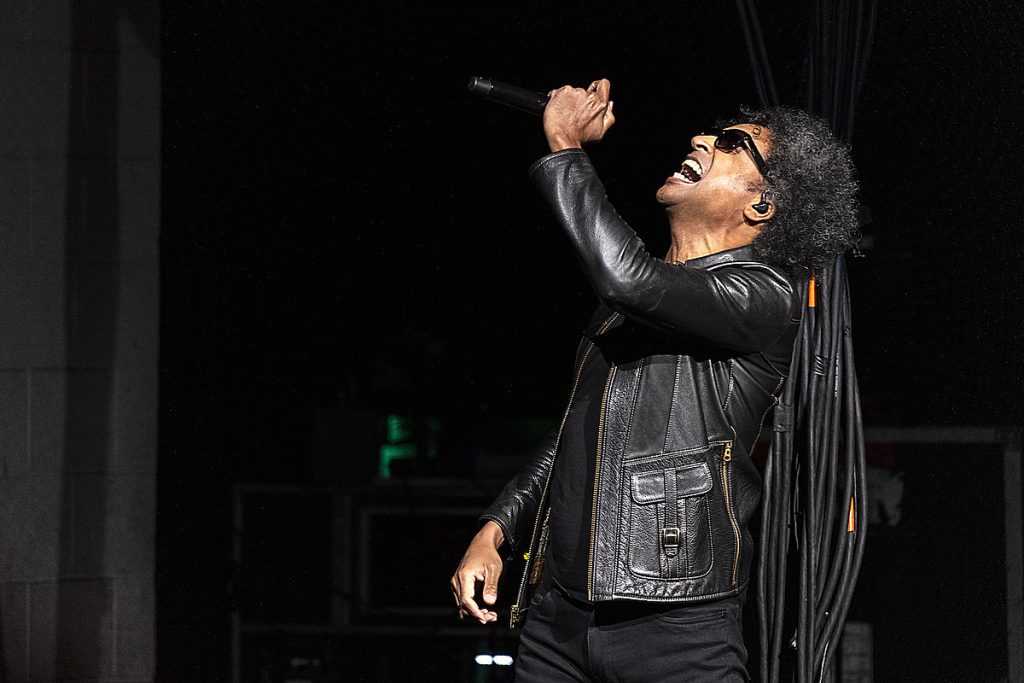
William DuVall on What It Was Like Working With The Hu
With William DuVall‘s latest solo album, 11.12.21, he and his band recorded live direct-to-disc in the legendary Welcome to 1979 studio in Nashville. What that means is that what you hear on the album is exactly what was played and recorded in the studio; there was no editing after the fact.
A few months after that, DuVall got invited to collaborate with The Hu and his experience was a little different.
“I was literally moving around vocal and instrumental parts,” DuVall told Chuck Armstrong on Loudwire Nights on Tuesday night (June 20). DuVall’s contribution was much more than a simple collaboration. Yes, he sang on “This Is Mongol (Warrior Souls)”—which will be part of The Hu’s upcoming deluxe version of Rumble of Thunder—but he also mixed it and engineered it all by himself.
“This was one of those things where it just sort of took on a life of its own.”
While some might think the stark differences between the making of 11.12.21 and “This Is Mongol (Warrior Souls)” would be jarring, there’s no question DuVall enjoyed the varying levels of producing and creating such diverse music.
“This particular track with The Hu was definitely unlike any other production and songwriting experience that I had ever had,” he explained. “Eventually, I just said, ‘Send me everything.’ I got it and I worked alone in this very room, carving and sculpting the record as it is now. I wasn’t in a conventional studio and they weren’t present, so I didn’t have them there or any representative of theirs in the room. I didn’t have any of that.”
It was clear in the conversation that this experience was very significant to DuVall because it was much deeper than him simply helping create the track; he wanted the song to mean something.
“How can we tell this story, get this point across in the best possible way where it doesn’t detract from what [The Hu] already do so uniquely and so well,” DuVall said of his task at re-imagining “This Is Mongol.”
“They’re representing their whole country, they’re representing much more than just their band and themselves … We tried to make an anthem out of [this song]. It was a very, very welcome challenge and a very, very cool experience. It turned out well and I’m glad they liked it so much.”
READ MORE: 10 Best Comeback Albums in Rock + Metal
And though DuVall’s level of involvement in the different projects he’s part of may look different, one thing has always and likely will always remain constant: His hands are all over any piece of music that he’s attached to.
“My solo work or anything else I’m doing, whether it’s Giraffe Tongue Orchestra or my previous band Comes With the Fall, all of those things, I’m really involved in,” he admitted. “In Alice [in Chains], it’s more like, whoever writes the song more or less charts the course and the other guys all sort of contribute within that framework. Yeah, a song like ‘So Far Under’ off of Rainier Fog, I came in with that music, I had that lyric, I had that arrangement, so for something like that, I charted the course. Other things, like ‘Never Fade’ on that same album, [Jerry] Cantrell had that chorus and that music, I took it and ran with it … There’s no one way things come together. For the most part, the writer sets the tone and the other guys complement the tone.”
What Else Did William DuVall Discuss on Loudwire Nights?
- Why 2023 was going to be a quiet year for Alice in Chains and what changed their plans
- What it was like recording his solo album, 11.12.21, in such a unique way
- How is songs evolve over time, like Alice in Chains’ “A Looking in View”
Listen to the Full Interview in the Podcast Player Below
William DuVall joined Loudwire Nights on Tuesday, June 20; the show replays online here, and you can tune in live every weeknight at 7PM ET or on the Loudwire app; you can also see if the show is available on your local radio station and listen to interviews on-demand. You can stream “This Is Mongol (Warrior Souls)” at this location and grab details on the deluxe edition of their album, Rumble of Thunder, here.
The History of Smashing Guitars in Rock ‘n’ Roll
Who was the first person to smash a guitar onstage? And how did it become a trend for musicians since then? Loudwire dug deep to uncover what we know about the history of destroying instruments in rock.